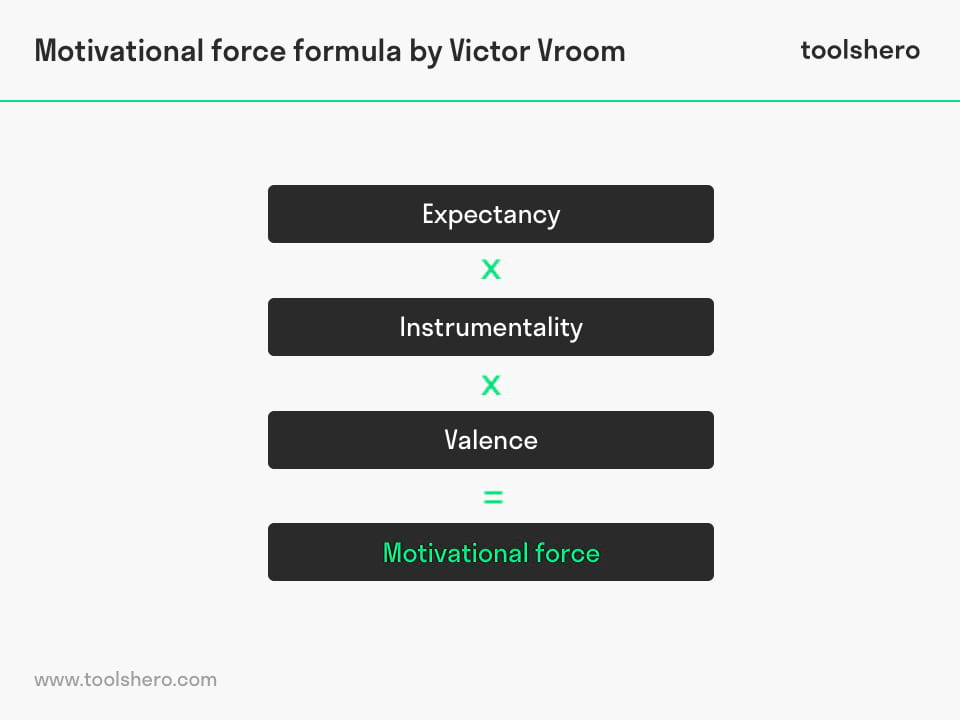Vroom’s Expectancy Theory of Motivation

Vroom’s Expectancy Theory of Motivation: this article describes Vroom’s Expectancy Theory of Motivation by Victor Vroom in a practical way. The article begins with the definition and background of this theory of motivation, followed by a paragraph about the 3 components of Vroom’s Expectancy Theory. The next part of the article is concerned with individual factors related to human motivation. Lastly, you will read about how you can apply this theory to your own life and working environment to work on your motivation. Enjoy reading!
What is Vroom’s Expectancy Theory of Motivation? The definition and background
In 1964, Canadian professor of psychology Victor Vroom from the Yale School of Management developed this theory. In it, he studied people’s motivation levels and concluded that human motivation depends on three factors: expectancy, instrumentality and valence.
Abraham Maslow and Frederick Herzberg also researched the relation between people’s needs and the efforts they make.
Victor Vroom distinguishes between the effort people put in, their performance and the final result. His theory primarily relates to motivation within a work environment. He concluded that putting in effort will result in a desirable reward.
When employees can make choices in their work, Victor Vroom argues that they will mostly choose that what motivates them the most.
What are the 3 components of Vroom’s Expectancy Theory of Motivation : Motivational force formula
Victor Vroom uses a formula to calculate the motivational force:
Motivational force = Expectancy x Instrumentality x Valence

Figure 1 – Expectancy Theory formula / diagram
In the next paragraphs the different components are further explained.
Expectancy
This is about what employees expect from their own efforts (expected outcome) and the relation to good performance and outcomes (performance expectancy). Part of this expectation is the level of difficulty he experiences, i. e. goal difficulty.
An organisation can respond to that by finding out which factors can motivate the employee to deliver his best possible performance. It’s about the connection between performance and right sources of motivation.
Those factors can be facilities, training or support from a supervisor who builds his employees’ confidence. Victor Vroom indicates that, in general, more effort leads to better performance. Employees can be stimulated to make an effort by offering them a juicy carrot if they complete their task properly and quickly.
Of course, it’s also important that they have the right resources at their disposal, that the employees have the necessary skills and that management provides the right level of support.
Instrumentality
Each employee is a cog in the machine and an instrument that contributes to the business results. Instrumentality is the belief and from that perspective, instrumentality isn’t difficult to grasp. It’s about the employee’s performance being good enough to achieve the desired outcome.
An organisation can stimulate this by actually making good on promises of additional rewards such as bonuses or promotion. The employee has to believe that if he performs well, appreciation will be shown for the results.
Transparency throughout the reward process is an important condition for instrumentality.
Valence
The final result that employees achieve is valued differently by each individual. This value is based on their own basic needs. As such, it’s a good idea for an organisation to find out what an individual employee values and what his personal needs are like sources of motivation. One might value money, while another values more days off.
Vroom’s Expectancy Theory : Individual factors
According to Victor Vroom, behaviour is the result of a conscious choice from alternatives. Employees have a preference for getting the most possible joy from their work with little effort.
Individual factors play a large role in the goals that have to be achieved and the behaviour of employees. For instance, think of an employee’s personality, his knowledge and skills, and the expectations he has of his own abilities.
Together, these form a motivating force that makes the employee act in a certain way. The individual effort, performance and motivation are always interconnected. To properly motivate employees, Vroom argues that it’s essential that there is a positive correlation between effort and performance.
Perception
Perception is an important factor in Vroom’s theory. An organisation might perceive that it, as an employer, offers its employees everything they need to sufficiently motivate them. For instance, a salary that’s 10% above industry average, 10 extra days off, training programmes, or career opportunities.
But not all employees will be sufficiently motivated by that; each individual has a different perception. There might be employees who would appreciate more support from their supervisor. If an organisation fails in that respect, chances are the employees will be less motivated.
Vroom’s Expectancy Theory of motivation is not always about employee’s personal interest in rewards. It’s also about the associations employees have regarding their performance and the result it will yield.
Application of Vroom’s Expectancy Theory
According to Vroom’s theory, you can expect employees will increase their efforts at work when the reward has more personal value to them. They’ll be more aware of the fact that there is a link between their effort and the results. It means that both the organisation and the employee have to be aware of the following three processes:
- Increased efforts will improve work performance
- Increased performance will lead to bigger rewards
- The offered reward will be appreciated by the employee
If one of these conditions is not met, it’s hard to motivate the employee. Particularly the last part can become an issue. An organisation therefore has to find out – together with its employees – which rewards individual employees value; which rewards motivate them.
Organisations often consider financial bonuses to be the best way to motivate employees, even though this theory shows that this is by no means always the most important factor to employees. That’s why there has to be a proper balance between offering a financial bonus and setting a clear performance standard, tailored to individual employees.
It’s Your Turn
What do you think? What is your experience with the Vroom’s Expectancy Theory of Motivation? Do you believe that working on your performance will result in a desirable reward? Do you recognize the practical explanation or do you have more additions? What are your success factors for motivating yourself and others?
Share your experience and knowledge in the comments box below.
More information
- Isaac, R. G., Zerbe, W. J., & Pitt, D. C. (2001). Leadership and motivation: The effective application of expectancy theory. Journal of managerial issues, 212-226.
- Lawler III, E. E., & Suttle, J. L. (1973). Expectancy theory and job behavior. Organizational behavior and human performance, 9(3), 482-503.
- Vroom, V. H. (1964). Work and motivation. Oxford, England: Wiley.
How to cite this article:
Mulder, P. (2018). Vroom’s Expectancy Theory of Motivation. Retrieved [insert date] from Toolshero: https://www.toolshero.com/psychology/vrooms-expectancy-theory/
Original publication date: 08/08/2018 | Last update: 05/09/2023
Add a link to this page on your website:
<a href=”https://www.toolshero.com/psychology/vrooms-expectancy-theory/”>Toolshero: Vroom’s Expectancy Theory of Motivation</a>













3 responses to “Vroom’s Expectancy Theory of Motivation”
am done with this theory and well equiped for the exam …..keep posting such good articles
It is very good. Thank you
It is very good theory. Well done vroom